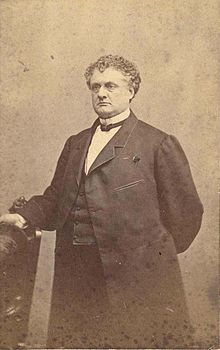
Back جون البيون اندرو ARZ جان آلبیون آندریو AZB John Albion Andrew German جان آلبیون اندرو Persian John Albion Andrew French John Andrew Italian 존 앨비언 앤드루 Korean Ioannes Albion Andrew Latin جان آلبیون اندریو Pashto/Pushto John Albion Andrew Portuguese
John Albion Andrew | |
|---|---|
 Carte de visite of Andrew, by James Wallace Black, 19th century | |
| 25th Governor of Massachusetts | |
| In office January 3, 1861 – January 4, 1866 | |
| Lieutenant | John Z. Goodrich John Nesmith Joel Hayden |
| Preceded by | Nathaniel P. Banks |
| Succeeded by | Alexander H. Bullock |
| Member of the Massachusetts House of Representatives from the 6th Suffolk district | |
| In office January 6, 1858 – January 5, 1859 Serving with George P. Clapp | |
| Preceded by | Countywide district |
| Succeeded by | Thornton K. Lothrop Martin Brimmer II |
| Personal details | |
| Born | May 31, 1818 Windham, Massachusetts (now Windham, Maine) |
| Died | October 30, 1867 (aged 49) Boston, Massachusetts |
| Political party | Whig (1840–1848) Free Soil (1848–1854) Republican (1854–1867) |
| Spouse | Eliza Jane Hersey |
| Children | John F. Andrew |
| Profession | Lawyer |
| Signature | |
John Albion Andrew (May 31, 1818 – October 30, 1867) was an American lawyer and politician from Massachusetts. He was elected in 1860 as the 25th Governor of Massachusetts, serving between 1861 and 1866, and led the state's contributions to the Union cause during the American Civil War (1861–1865). He was a guiding force behind the creation of some of the first African-American units in the United States Army, including the 54th Massachusetts Infantry. He belonged to the Whig, Free Soil, and Republican parties during his career.
Educated at Bowdoin College, Andrew was a radical abolitionist of slavery from an early age, engaged in the legal defense of fugitive slaves against owners seeking their return. He provided legal support to John Brown after his 1859 raid on Harpers Ferry, Virginia, raising his profile and propelling him to the Massachusetts governor's chair. Andrew was a persistent voice criticizing President Abraham Lincoln's conduct of the war, and pressing him to end slavery. By the end of the war, his politics had moderated, and he came to support the Reconstruction policies of Lincoln's successor, Andrew Johnson.
In Massachusetts, Andrew opposed the Know Nothing movement of the 1850s and the state's strict alcohol prohibition laws, and oversaw the state takeover of the Hoosac Tunnel construction project. In 1865, he signed legislation establishing the Massachusetts State Police, the first statewide police force of its type in the nation. He died early of apoplexy at the age of 49.
© MMXXIII Rich X Search. We shall prevail. All rights reserved. Rich X Search